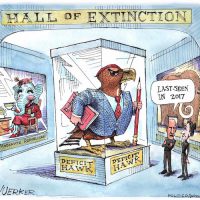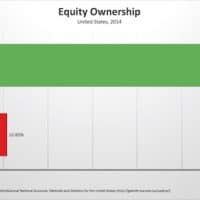-
U.S. militarism marches on
Republicans and Democrats like to claim that they are on opposite sides of important issues. Of course, depending on which way the wind blows, they sometimes change sides, like over support for free trade and federal deficits. Tragically, however, there is no division when it comes to militarism.
-
“We need new revolutionary tools to advance the struggle of the working class”
To this day, “NUMSA has not deviated from its perspective of Marxism, Leninism and its goal of building a socialist South Africa,” says Karl Cloete
-
Disappearing poverty
In international human rights law, a “forced disappearance” occurs when a person is secretly abducted or imprisoned by a state or political organization (or by a third party with the authorization, support, or acquiescence of a state or political organization), followed by a refusal to acknowledge the person’s fate and whereabouts, with the intent of placing the victim outside the protection of the law.
-
The New Postcolonial Economics with Fadhel Kaboub
In this episode, we speak with Fadhel Kaboub (@fadhelkaboub), associate professor of economics at Denison University and President of the Global Institute for Sustainable Prosperity. Fadhel outlines a new critical approach to postcolonial political economy, arguing that re-gaining financial sovereignty is a crucial next step for postcolonial nations hoping to achieve social, economic, and environmental justice.
-
Trump’s “infrastructure” plan: pump up the Pentagon
This year alone will bring total spending on the Pentagon and related agencies (like the Department of Energy where work on nuclear warheads takes place) to $716 billion.
-
No migration without economic exploitation
Why are thousands of Central Americans fleeing violence and economic devastation and flocking to the United States? Because of the American dream? Because the streets are paved in gold?
-
White farms and black farms: will South African land finally shed apartheid’s proportions?
Many here say that South Africa’s constitution has never been an impediment to land redistribution; the problem was always the political will of the ANC, which abandoned Marxist ideology for a neoliberal approach.
-
Understanding Puerto Rico’s debt crisis through Marx, monsters and a queer decolonial lens
Colorlines talks to Philadelphia poet laureate Raquel Salas Rivera about their new book, “lo terciario/the tertiary,” which revisits Karl Marx’s “Capital” to examine Puerto Rico’s debt crisis from a queer decolonial lens.
-
Living on the edge: Americans in a time of “prosperity”
These are supposed to be the good times—with our current economic expansion poised to set a record as the longest in U.S. history.
-
Earth’s circular economy: recycling as a law of life
On every scale, from the smallest cells to the entire planet, the essential elements of life are constantly used and re-used. Biogeochemical cycles are the basis of the biosphere.
-
Marx and the cinema
Dennis Broe traces the history of the representation of labour on screen, and finds inspiration for celebrating May Day and continuing Marx’s struggle against capitalism.
-
Debt and taxes
Tax cuts and spending increases enacted by Republicans over the past four months will lead to wider than previously expected budget deficits, according to the Congressional Budget Office. The federal budget deficit would total $804 billion this year, 43 percent higher than it had projected last summer, and exceed $1 trillion a year starting in 2020.
-
The imperial intentions of Trump’s trade war babble
In defence of his trade war with China, Trump claims that ‘when you’re $500bn down you can’t lose.’ The problem with this stance is that persistent U.S. trade deficits with China are arguably a sign of U.S. strength or even imperial privilege, not weakness. However, on this issue, he has much of conventional economics wisdom supporting him in his delusions that the U.S. is being treated unfairly or is ‘behind’ based on these deficits.
-
Is France heading for another May ’68?
Just fifty years ago on March 22nd we saw the beginning of the events in France which terrified the ruling class, led to one of the biggest general strikes ever, along with a wave of factory occupations, and could only be calmed by important concessions from the bosses (minimum wage raised by 35% and new workplace organising rights guaranteed for trade unions). For the first time for decades, the spectre of revolution in the West seemed real.
-
Basic income: progressive cloak & neoliberal dagger
For almost three decades, the Ontario Coalition Against Poverty (OCAP) has been fighting against neoliberal austerity, especially that aspect of it that has involved systematically degrading systems of income support. The underlying motive in this attack has been to render benefit provision as inadequate and precarious as possible so as to create the desperation that can drive people into the expanding low wage sector.
-
Banking reforms in the context of subordinate financialization
It is both an honor and a pleasure to be here at the event of marking the 75th Anniversary of the Ceylon Bank Employees Union. First, let me offer my heartfelt greetings to CBEU, its office bearers and membership. CBEU has had a proud and celebrated history of struggles that helped immensely to record so many victories to improve the conditions of the working class in general and the bank employees in particular.
-
Buyback this!
I have been arguing, since 2016, that one of the likely outcomes of the kind of corporate tax cuts Donald Trump and his fellow Republicans have supported—and, as we saw, eventually rammed through—would be an increase in inequality.
-
2008 financial collapse all over again…? We need to understand the student loan speculation bubble
For those who may have missed it, a major economic indicator emerged regarding student loan debt last week. Excessive debt, like student loans, has become one of the biggest barriers to current economic growth in the United States. On Thursday, March 1, 2018, the Chairman of the Federal Reserve, Jerome Powell, appeared before U.S. Congressional representatives.
-
Utopia and healthcare (part 1)
I’ve written quite a bit about the U.S. healthcare dystopia over the years—including a seven-part series back in 2016.* But I haven’t yet addressed the utopian dimensions of healthcare reform.
-
Willetts the conqueror: introduction
Before Jo Johnson and Sam Gyimah, there was David Willetts. As the Minister of State for Universities and Science from 2010 until 2014, under the Tory-led ‘coalition’ government, Willetts oversaw the introduction of a market into the English higher education system – often referred to as ‘marketisation’.




















